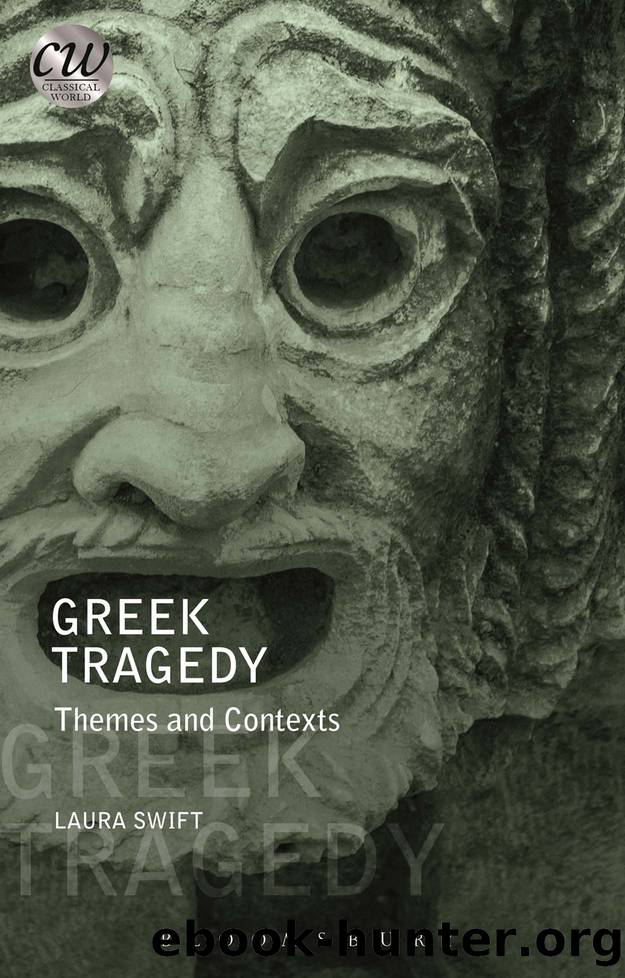Greek Tragedy by Laura Swift;

Author:Laura Swift; [Swift, Laura]
Language: eng
Format: epub
ISBN: 9781474236843
Publisher: Bloomsbury
Published: 2016-06-25T05:00:00+00:00
Euripides the âradicalâ and divine morality
Thus far we have assumed a coherent âtragic theologyâ that can be found across different plays. However, there is a long tradition of treating Euripides as an iconoclast and his reputation for radicalism is largely based on his treatment of the gods. This dates back to Aristophanes, who makes a vendor of religious garlands complain in his comedy Women at the Thesmophoria that Euripidesâ plays have damaged her business, since he has persuaded many people that the gods do not exist (450â2). Modern scholars have often accepted the image of Euripides as a rebel, and this continues to be the dominant tradition in studies of his work.
It is true that the gods of Euripides act selfishly and that their behaviour is disturbing. However, as we have seen, this is a tradition that date back to Homer, and although Euripides may foreground it in his work, it is by no means unique to him. We must be cautious in using Aristophanes as a source, since humour can be hard to interpret. Jokes may be funny because they are true, but they can also generate humour for quite different reasons (for example, because they are so bizarre and far from reality). The garland-sellerâs comments must be taken with a certain detachment: it would be strange to claim that the logical response to a play like Bacchae, where a mortal is severely punished for refusing to accept divinity, would be to stop worshipping the gods. We have also seen that there are basic theological continuities across tragedy. It is hard to argue that it is worse for Aphrodite to punish Hippolytus than for Athena to punish Ajax, when both mortals are guilty of the crime of disrespect. However, the clearest difference between Euripides and his rivals is the frequency with which his gods appear on stage. Twelve of his seventeen surviving tragedies contain a divine appearance, compared with only one of Aeschylusâ six (excluding Prometheus Bound) and two of Sophoclesâ seven. A play like Ajax, where we are confronted with a vengeful deity explaining their motivations, appears to have been fairly unusual for Sophocles. In most of Aeschylusâ and Sophoclesâ plays, human characters may claim to know what the gods wish, but their actual intentions are left veiled as we can access them only through oracles, portents and fallible human understanding. Presenting the gods on stage makes us confront their motivations, and rather than mysterious and wise, they often seem petty and personal.
Moreover, Euripidesâ plays often contain characters who complain about the behaviour of the gods, and who suggest that they ought to be kinder than they really are. The servant in Hippolytus who warns the hero of Aphroditeâs anger prays to the goddess and begs her to let her grudge go, telling her that âgods should be wiser than menâ (120). Similarly, Cadmus at the end of Bacchae claims that âit is not right for gods to be like mortals in their angerâ (1348), while in Ion
Download
This site does not store any files on its server. We only index and link to content provided by other sites. Please contact the content providers to delete copyright contents if any and email us, we'll remove relevant links or contents immediately.
The Power of Myth by Joseph Campbell & Bill Moyers(925)
Half Moon Bay by Jonathan Kellerman & Jesse Kellerman(911)
A Social History of the Media by Peter Burke & Peter Burke(880)
Inseparable by Emma Donoghue(844)
The Nets of Modernism: Henry James, Virginia Woolf, James Joyce, and Sigmund Freud by Maud Ellmann(739)
The Spike by Mark Humphries;(719)
A Theory of Narrative Drawing by Simon Grennan(706)
The Complete Correspondence 1928-1940 by Theodor W. Adorno & Walter Benjamin(704)
Ideology by Eagleton Terry;(659)
Bodies from the Library 3 by Tony Medawar(649)
Culture by Terry Eagleton(646)
World Philology by(645)
Farnsworth's Classical English Rhetoric by Ward Farnsworth(641)
A Reader’s Companion to J. D. Salinger’s The Catcher in the Rye by Peter Beidler(614)
Adam Smith by Jonathan Conlin(607)
High Albania by M. Edith Durham(592)
Game of Thrones and Philosophy by William Irwin(592)
Comic Genius: Portraits of Funny People by(581)
Monkey King by Wu Cheng'en(575)
